(完整word版)小学英语句型转换专项练习
- 格式:pdf
- 大小:15.93 KB
- 文档页数:4
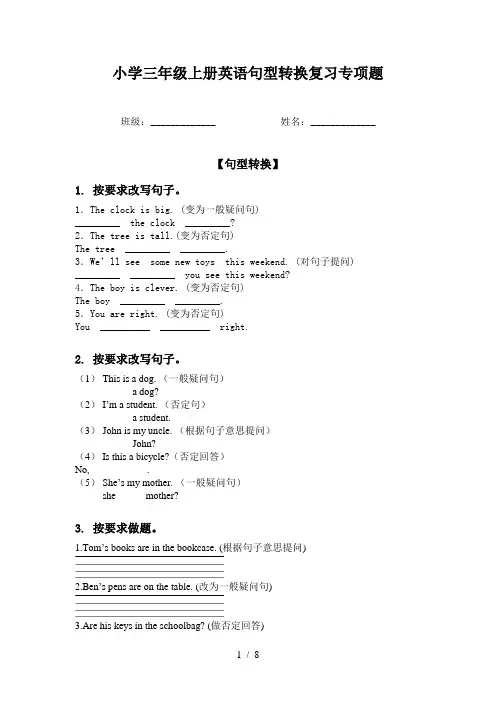
小学三年级上册英语句型转换复习专项题班级:_____________ 姓名:_____________【句型转换】1. 按要求改写句子。
1.The clock is big. (变为一般疑问句)_________ the clock _________?2.The tree is tall.(变为否定句)The tree _________ _________.3.We’ll see some new toys this weekend. (对句子提问)_________ _________ you see this weekend?4.The boy is clever. (变为否定句)The boy _________ _________.5.You are right. (变为否定句)You __________ __________ right.2. 按要求改写句子。
(1) This is a dog. (一般疑问句)_____ _____ a dog?(2) I’m a student. (否定句)_____ _____ a student.(3) John is my uncle. (根据句子意思提问)_____ _____ John?(4) Is this a bicycle?(否定回答)No, _____ _____.(5) She’s my mother. (一般疑问句)_____ she _____ mother?3. 按要求做题。
1.Tom’s books are in the bookcase. (根据句子意思提问)2.Ben’s pens are on the table. (改为一般疑问句)3.Are his keys in the schoolbag? (做否定回答)4.That’s not my watch. (改为肯定句)4. 按要求改写句子。
1. Those are my legs. (改为一般疑问句)________ those ________ ________?2. We can touch with our hands. (句子提问)________ can ________ _________with ________ hands?3. Alice has eleven flowers. (句子提问)________ ________ ________ does Alice have?4. My feet are big. (句子提问)________ are ________ feet?5. There are some pictures in the classroom. (改为否定句) There ________ ________ ________ in the classroom.5. 按要求改写句子。
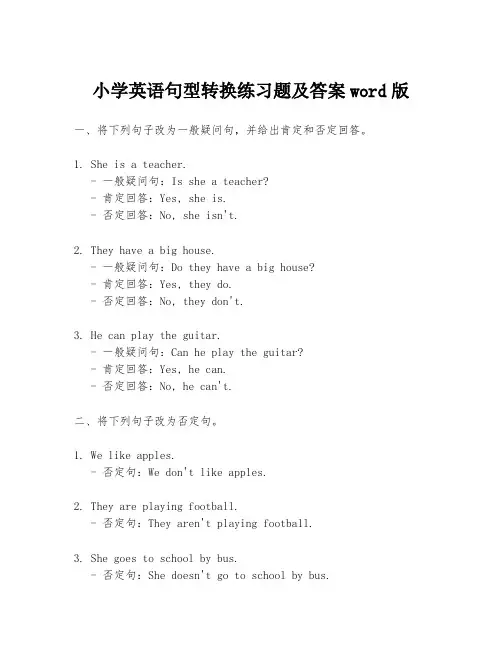
小学英语句型转换练习题及答案word版一、将下列句子改为一般疑问句,并给出肯定和否定回答。
1. She is a teacher.- 一般疑问句:Is she a teacher?- 肯定回答:Yes, she is.- 否定回答:No, she isn't.2. They have a big house.- 一般疑问句:Do they have a big house?- 肯定回答:Yes, they do.- 否定回答:No, they don't.3. He can play the guitar.- 一般疑问句:Can he play the guitar?- 肯定回答:Yes, he can.- 否定回答:No, he can't.二、将下列句子改为否定句。
1. We like apples.- 否定句:We don't like apples.2. They are playing football.- 否定句:They aren't playing football.3. She goes to school by bus.- 否定句:She doesn't go to school by bus.三、将下列句子改为特殊疑问句,并给出答案。
1. The cat is under the table.- 特殊疑问句:Where is the cat?- 答案:The cat is under the table.2. He has three brothers.- 特殊疑问句:How many brothers does he have? - 答案:He has three brothers.3. She is going to the park tomorrow.- 特殊疑问句:When is she going to the park? - 答案:She is going to the park tomorrow.四、将下列句子改为现在进行时。
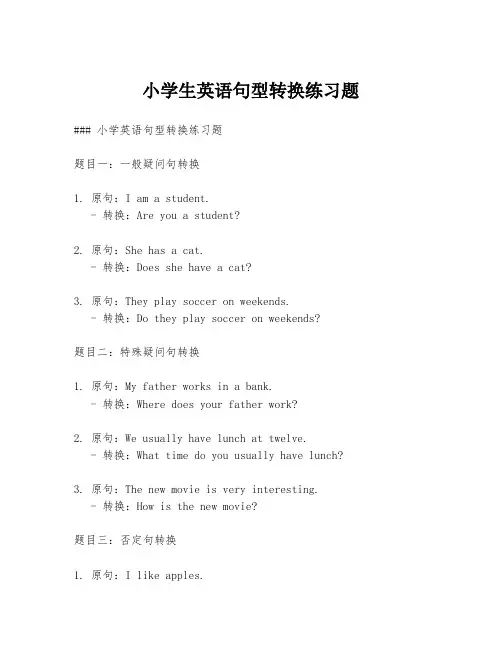
小学生英语句型转换练习题### 小学英语句型转换练习题题目一:一般疑问句转换1. 原句:I am a student.- 转换:Are you a student?2. 原句:She has a cat.- 转换:Does she have a cat?3. 原句:They play soccer on weekends.- 转换:Do they play soccer on weekends?题目二:特殊疑问句转换1. 原句:My father works in a bank.- 转换:Where does your father work?2. 原句:We usually have lunch at twelve.- 转换:What time do you usually have lunch?3. 原句:The new movie is very interesting.- 转换:How is the new movie?题目三:否定句转换1. 原句:I like apples.- 转换:I don't like apples.2. 原句:She can swim.- 转换:She can't swim.3. 原句:They are at home.- 转换:They are not at home.题目四:陈述句转换为一般疑问句1. 原句:The cat is under the table.- 转换:Is the cat under the table?2. 原句:He is doing his homework.- 转换:Is he doing his homework?3. 原句:We are going to the park tomorrow.- 转换:Are you going to the park tomorrow? 题目五:陈述句转换为否定句1. 原句:She watches TV every evening.- 转换:She doesn't watch TV every evening.2. 原句:They are playing basketball.- 转换:They are not playing basketball.3. 原句:I have a new book.- 转换:I don't have a new book.题目六:反意疑问句1. 原句:He is a good student, isn't he?- 转换:He isn't a good student, is he?2. 原句:She can speak English, can't she?- 转换:She can't speak English, can she?3. 原句:They are going to the concert, aren't they?- 转换:They aren't going to the concert, are they?题目七:被动语态转换1. 原句:We make the cake.- 转换:The cake is made by us.2. 原句:They clean the room.- 转换:The room is cleaned by them.3. 原句:She writes a letter.- 转换:A letter is written by her.题目八:条件句转换1. 原句:If it rains, we will stay at home.- 转换:We will stay at home if it rains.2. 原句:If she has time, she will help us.- 转换:She will help us if she has time.3. 原句:If they finish their homework, they can go out. - 转换:They can go out if they finish their homework.通过这些练习题,小学生可以更好地掌握英语句型的转换,提高语言运用的灵活性和准确性。
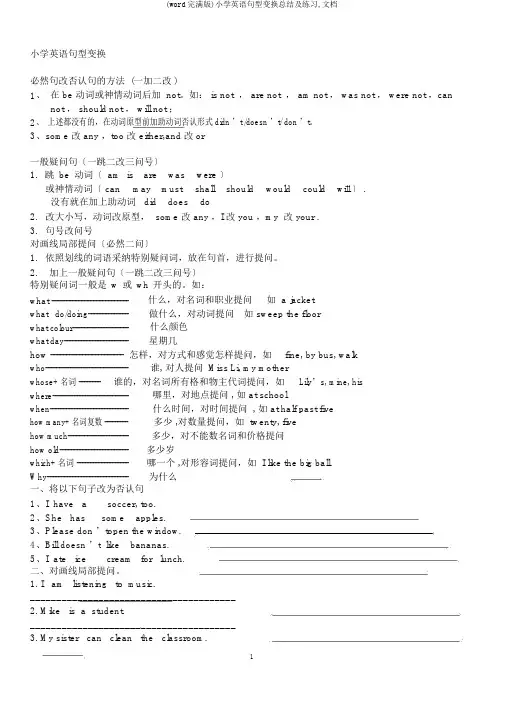
小学英语句型变换必然句改否认句的方法 (一加二改 )1、在 be 动词或神情动词后加 not。
如: is not , are not , am not , was not , were not ,cannot , should not , will not ;2、上述都没有的,在动词原型前加助动词否认形式didn ’t/doesn ’t/ don ’t。
3、some 改 any ,too 改 either,and 改 or一般疑问句〔一跳二改三问号〕1.跳be动词〔am is are was were 〕或神情动词〔 can may must shall should would could will 〕 .没有就在加上助动词did does do2.改大小写,动词改原型, some 改 any ,I 改 you ,my 改 your .3.句号改问号对画线局部提问〔必然二问〕1.依照划线的词语采纳特别疑问词,放在句首,进行提问。
2.加上一般疑问句〔一跳二改三问号〕特别疑问词一般是w 或wh 开头的。
如:what --------------------------什么,对名词和职业提问如 a jacketwhat do/doing--------------做什么,对动词提问如 sweep the floorwhat colour--------------------什么颜色what day-----------------------星期几how -----------------------怎样,对方式和感觉怎样提问,如fine, by bus, walkwho------------------------------谁, 对人提问 Miss Li, my motherwhose+ 名词 --------谁的,对名词所有格和物主代词提问,如Lily’s, mine, hiswhere----------------------------哪里,对地点提问 , 如 at schoolwhen-----------------------------什么时间,对时间提问 , 如 at half past fivehow many+ 名词复数 ---------多少 ,对数量提问,如 twenty, fivehow much----------------------多少,对不能数名词和价格提问how old------------------------多少岁which+ 名词 -------------------哪一个 ,对形容词提问,如 I like the big ball.Why-----------------------------为什么一、将以下句子改为否认句1、I have a soccer, too.2、She has some apples.3、Please don ’topen the window.4、Bill doesn ’t like bananas.5、I ate ice cream for lunch.二、对画线局部提问。
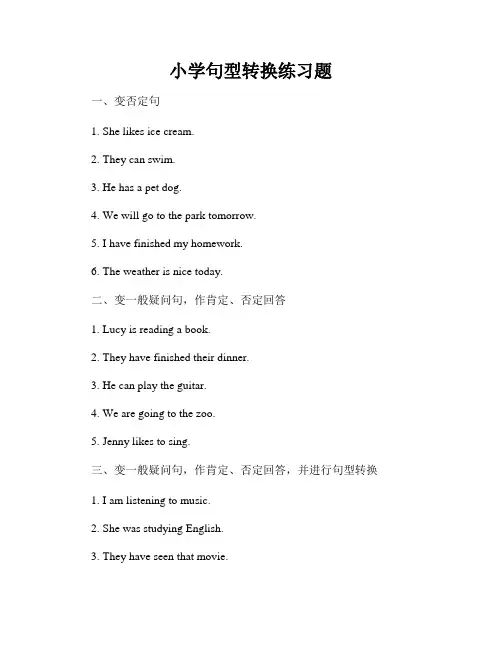
小学句型转换练习题一、变否定句1. She likes ice cream.2. They can swim.3. He has a pet dog.4. We will go to the park tomorrow.5. I have finished my homework.6. The weather is nice today.二、变一般疑问句,作肯定、否定回答1. Lucy is reading a book.2. They have finished their dinner.3. He can play the guitar.4. We are going to the zoo.5. Jenny likes to sing.三、变一般疑问句,作肯定、否定回答,并进行句型转换1. I am listening to music.2. She was studying English.3. They have seen that movie.4. He will visit his grandparents.5. We can speak French.四、变选择疑问句1. Lisa likes chocolate ______ vanilla ice cream?2. ________ he go to the park or the beach?3. ________ your sister play the piano or the violin?4. ________ they stay at home or go shopping?5. ________ we have dinner now or later?五、完成对话A: What did you do yesterday?B: I played soccer with my friends.A: __________ you have fun?B: Yes, I __________.六、改写句子1. I have a red ball.2. They were playing in the garden.3. She will sing a song at the concert.4. We can see the stars at night.5. He likes to watch cartoons.七、连词成句1. likes, Sam, ice cream.2. my, has, brother, dog, a.3. are, you, doing, what?4. can, read, I, books.5. homework, my, doing, I, am.八、翻译句子1. 我们明天要去海边。
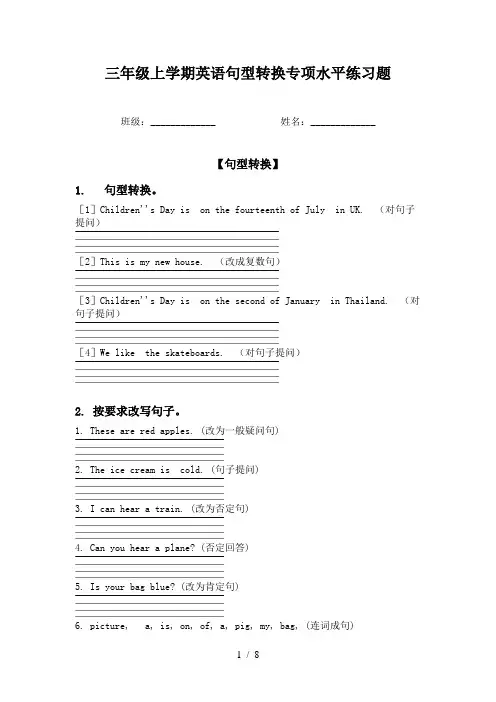
三年级上学期英语句型转换专项水平练习题班级:_____________ 姓名:_____________【句型转换】1. 句型转换。
[1]Children''s Day is on the fourteenth of July in UK. (对句子提问)[2]This is my new house. (改成复数句)[3]Children''s Day is on the second of January in Thailand. (对句子提问)[4]We like the skateboards. (对句子提问)2. 按要求改写句子。
1. These are red apples. (改为一般疑问句)2. The ice cream is cold. (句子提问)3. I can hear a train. (改为否定句)4. Can you hear a plane? (否定回答)5. Is your bag blue? (改为肯定句)6. picture, a, is, on, of, a, pig, my, bag, (连词成句)3. 句型转换。
[1]Wei Hua was washing clothes last night. (对句子提问)________ ________Wei Hua ________clothes?[2]You’d better get to sleep earlier, or you’ll be tired. (同义句转换)If you ________ ________ ________earlier, you won’t be tired. [3]While we were talking, the teacher came in. (对句子提问)________did the teacher________ ________?[4]He saw the bag before his bike hit it. (用until转换)He________ ________the bag ________his bike hit it.[5]You help me with English. It’s nice of you. (连成一句)It’s nice of you ________ ________ ________with English.[6]I’m sorry he isn’t here right now.I’m sorry he’s ________ at the________.[7]I hope to see him as soon as possible.I hope to see him as ________as ________ ________.[8]He says that he won’t be free until tomorrow.He says that he________ ________free ________tomorrow.[9]It’s best to travel by train.________by train ________the ________.4. 改写句子。
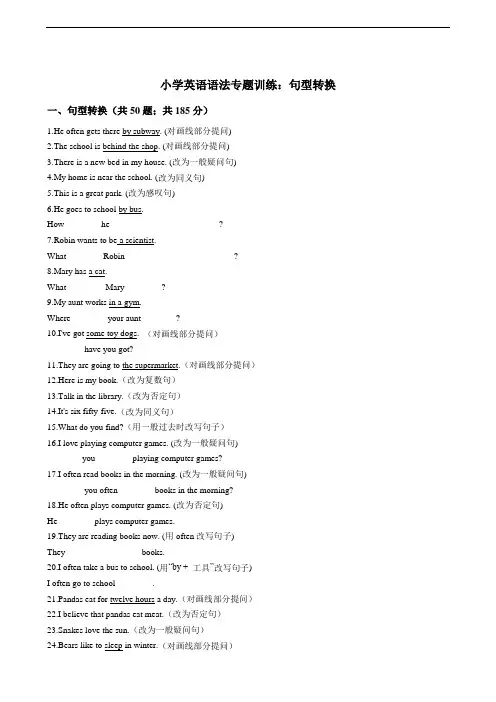
小学英语语法专题训练:句型转换一、句型转换(共50题;共185分)1.He often gets there by subway. (对画线部分提问)2.The school is behind the shop. (对画线部分提问)3.There is a new bed in my house. (改为一般疑问句)4.My home is near the school. (改为同义句)5.This is a great park. (改为感叹句)6.He goes to school by bus.How________ he________ ________ ________?7.Robin wants to be a scientist.What________ Robin________ ________ ________?8.Mary has a cat.What ________ Mary ________?9.My aunt works in a gym.Where________ your aunt________?10.I've got some toy dogs. (对画线部分提问)________ have you got?11.They are going to the supermarket.(对画线部分提问)12.Here is my book.(改为复数句)13.Talk in the library.(改为否定句)14.It's six fifty-five.(改为同义句)15.What do you find?(用一般过去时改写句子)16.I love playing computer games. (改为一般疑问句)________you ________playing computer games?17.I often read books in the morning. (改为一般疑问句)________ you often ________books in the morning?18.He often plays computer games. (改为否定句)He ________plays computer games.19.They are reading books now. (用often改写句子)They ________ ________ books.20.I often take a bus to school. (用“by + 工具”改写句子)I often go to school ________.21.Pandas eat for twelve hours a day.(对画线部分提问)22.I believe that pandas eat meat.(改为否定句)23.Snakes love the sun.(改为一般疑问句)24.Bears like to sleep in winter.(对画线部分提问)25.Amy likes fish. I don't like fish.(用but连接句子)26.Have you got a toy car, Jim?(作否定回答)27.I've got a beautiful kite. I can't fly it.(用but连接成一句话)28.Have you got a stamp from China? (作否定回答)No, ________ ________.29.There's a letter for you.(改为一般疑问句)________ ________ a letter for me?30.I have got some stamps from Canada. (改为一般疑问句)________ you got ________ stamps from Canada?31.What's that? (改为复数句)What ________ ________?32.He read a book yesterday evening. (改为否定句)He ________ ________ ________a book yesterday evening.33.I can sing this song now.(用one year ago改写句子)I ________ ________this song one year ago.34.Jim visited the Summer Palace last year.(改为否定句)Jim ________ ________the Summer Palace last year.35.She saw many interesting things in Shanghai. (改成一般疑问句并作否定回答)________ she ________many interesting things in Shanghai? No, she ________. 36.I was a student five years ago. (改为一般疑问句,并作否定回答)—________ ________ a student five years ago?—________, I ________.37.My father used the telephone at home to call people.(改为一般疑问句)________ your father ________ the telephone at home to call people?38.She saw some cool cars in the shop. (改为一般疑问句)________she________ ________ cool cars in the shop?39.I went to the Great Wall for the holiday. (对画线部分提问)________ ________ you go for the holiday?40.It was great fun. (改为感叹句)________ ________ ________ it was!41.Did you go fishing last Sunday? (改成陈述句)________ ________ fishing last Sunday.42.Mike goes to school on foot.(就画线部分提问)43.John is sad.(写出问句)44.John likes reading books.(改为一般疑问句)45.My mother works in a zoo.(就画线部分提问)46.We can go to the zoo today.(否定句)47.My father is a teacher.(就画线部分提问)48.John often does sports on the weekend.(改为否定句)49.He lives in China.(改为一般疑问句)50.Is your father a teacher? (肯定回答)答案解析部分一、句型转换1.【答案】How does he often get there?【考点】句型转换【解析】【分析】句意:他经常乘地铁到那里。
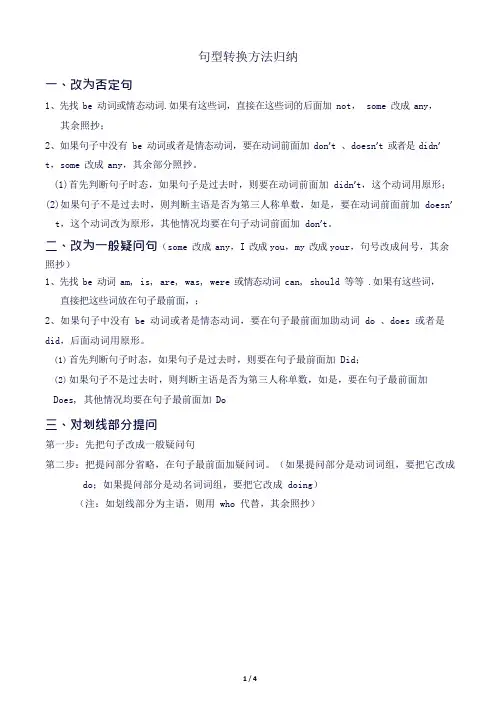
句型转换方法归纳一、改为否定句1、先找 be 动词或情态动词.如果有这些词,直接在这些词的后面加 not, some 改成 any,其余照抄;2、如果句子中没有 be 动词或者是情态动词,要在动词前面加 don’t 、doesn’t 或者是 didn’ t,some 改成 any,其余部分照抄。
(1)首先判断句子时态,如果句子是过去时,则要在动词前面加 didn’t,这个动词用原形;(2)如果句子不是过去时,则判断主语是否为第三人称单数,如是,要在动词前面前加 doesn’t,这个动词改为原形,其他情况均要在句子动词前面加 don’t。
二、改为一般疑问句(some 改成 any,I 改成you,my 改成your,句号改成问号,其余照抄)1、先找 be 动词 am, is, are, was, were 或情态动词 can, should 等等 .如果有这些词,直接把这些词放在句子最前面,;2、如果句子中没有 be 动词或者是情态动词,要在句子最前面加助动词 do 、does 或者是did,后面动词用原形。
(1)首先判断句子时态,如果句子是过去时,则要在句子最前面加 Did;(2)如果句子不是过去时,则判断主语是否为第三人称单数,如是,要在句子最前面加Does, 其他情况均要在句子最前面加 Do三、对划线部分提问第一步:先把句子改成一般疑问句第二步:把提问部分省略,在句子最前面加疑问词。
(如果提问部分是动词词组,要把它改成do;如果提问部分是动名词词组,要把它改成 doing)(注:如划线部分为主语,则用 who 代替,其余照抄)一,对下列句子中划线部分提问1,The deepest part(最深的部分)of the water is near Japan. 2,My father will take me to Beijing.3,My trip to Xi’an is great.4,Harry Potter Ⅳwill be on this afternoon.5,I’m looking for a dress.7,I saw many animals in Beijing Zoo.8,I often help my grandfather on the farm.9,I am from Australia.10,We will go to the nearest supermarket.11,My new pencil-box is about ten yuan.12,The name of the book is Sleeping Beauty.13,He came to visit China two days ago.14,There are twelve students over there.16,These sneakers are 280 yuan.17,I get up at 6 o’clock every morning.20,Tom saw many places of interest(名胜古迹)in that old city. 21,I came here by train.22,We are going to buy tomorrow’s air tickets.23,He’s making a model ship.24,My father works in Africa.25,Mike wants to be a singer(歌手) in the future.二,把下列句子变为一般疑问句:1.I am good at swimming.2.Mike is a student in Grade Six.3.Tom likes listening to the music4.Sarah can clean the classroom.6.H e came to visit China two days ago(两天前).7.I can speak English well.8.Tony had a picnic for a long time.9.They like making the cakes.10.Jim and Ben often help their grandfather on the farm after school.12.He wants to be an actor(演员)in the future(将来).13.We play basketball on Sundays.14.We should take care of(照看)the young trees.15.The girls are singing in the classroom.16.She has something to eat.17.Alice came to our home last week.18.The little boy is standing on the man's shoulders.19.There is some fruit juice in the glass.20.We will visit America next week(下一周).三,将下列句子变为否定句:1.He takes some pictures every day.4.Show me your library card, please.8.T here are a lot of lovely animals there.9.M y mother will take me to Beijing next Sunday.10.You can find many tall trees in the picture .“”“”At the end, Xiao Bian gives you a passage. Minand once said, "people who learn to learn are very happy people.". In every wonderful life, learning is an eternal theme. As a professional clerical and teaching position, I understand the importance of continuous learning, "life is diligent, nothing can be gained", only continuous learning can achieve better self. Only by constantly learning and mastering the latest relevant knowledge, can employees from all walks of life keep up with the pace of enterprise development and innovate to meet the needs of the market. This document is also edited by my studio professionals, there may be errors in the document, if there are errors, please correct, thank you!。
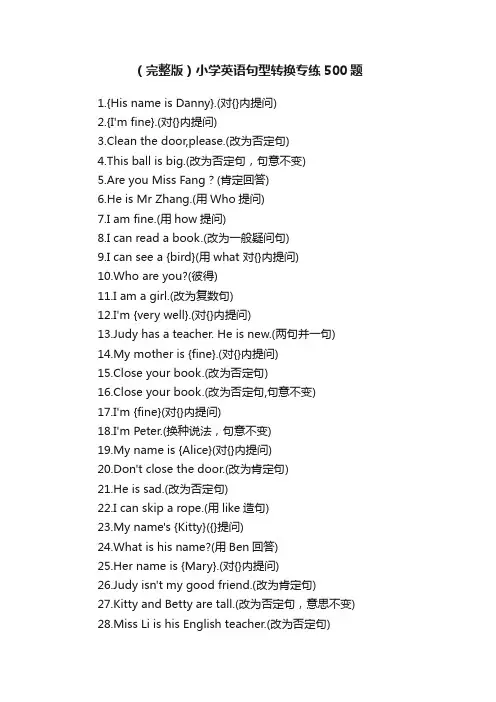
(完整版)小学英语句型转换专练500题1.{His name is Danny}.(对{}内提问)2.{I'm fine}.(对{}内提问)3.Clean the door,please.(改为否定句)4.This ball is big.(改为否定句,句意不变)5.Are you Miss Fang?(肯定回答)6.He is Mr Zhang.(用Who提问)7.I am fine.(用how提问)8.I can read a book.(改为一般疑问句)9.I can see a {bird}(用what 对{}内提问)10.Who are you?(彼得)11.I am a girl.(改为复数句)12.I'm {very well}.(对{}内提问)13.Judy has a teacher. He is new.(两句并一句)14.My mother is {fine}.(对{}内提问)15.Close your book.(改为否定句)16.Close your book.(改为否定句,句意不变)17.I'm {fine}(对{}内提问)18.I'm Peter.(换种说法,句意不变)19.My name is {Alice}(对{}内提问)20.Don't close the door.(改为肯定句)21.He is sad.(改为否定句)22.I can skip a rope.(用like造句)23.My name's {Kitty}({}提问)24.What is his name?(用Ben回答)25.Her name is {Mary}.(对{}内提问)26.Judy isn't my good friend.(改为肯定句)27.Kitty and Betty are tall.(改为否定句,意思不变)28.Miss Li is his English teacher.(改为否定句)29.My teacher's name is Selina.(用what提问)30.Open the pencilbox.(改为否定句)31.The balloon is small.(改为否定句)32.The boys are happy.(改为否定句,句意不变)33.The teacher has nice jam.(改为复数句)34.The window isn't dirty.(改为同义句)35.I'm a good pupil.(改为否定句)36.You are a tall teacher.(改为否定句)37.She is a nice girl.(改为否定句)38.We have a new teacher.(改为否定句)39.Alice can make a puppet.(改为否定句)40.Clean the window,please.(改为否定句41.Eddie can draw.He can't write.(两句并一句)42.Happy birthday.(写出应答句)43.He can sing and dance.(改为否定句)44.Here is your cake.(改为复数句)45.I'm eight.(改为一般疑问句)46.Kitty is {ten}.(对{}内提问)47.My friend is {eight years old}.(对{}内提问)48.My name is {Kitty}.(对{}内提问)49.Today is hot.(改为否定句,句意不变)50.He is {fine}.(就{}内提问)51.I can draw a tree.(改为一般疑问句,并作否定回答)52.I'm {eight years old}.({}内提问)53.I'm {Kitty}.({}内提问)54.She is eight.(改为否定句)55.My friend is{five years old}.({}内提问)56.My name is {Linda}.(对{}内提问)57.Peter is eight years old.(改为一般疑问句)58.Today is cold.(改为否定句)59.Today is cold.(改为否定句,句意不变)60.Are you ten?(肯定回答)61.Are you two years old?(否定回答)62.Judy and Lily are both ten.(改为一般疑问句)63.Judy can count the rulers.(改为一般疑问句)64.Kitty is {nine}.(对{}内提问)65.Miss Cat is {ten years old}.(对{}内提问)66.Mrs Fang can draw a big tree.(改为否定句)67.My sister is ten.(改为一般疑问句)68.She's one.(改为同义句)69.Wendy and Peter can draw {the trees}.(对{}内提问)70.You are Mr Cat.(改为否定句)71.Peter is Chinese.(一般疑问句,肯定回答)72.{Kitty}is my good friend.(对{}内提问)73.Her name is {Alice}.(对{}内提问)74.My tail is not long.(改为肯定句,句意不变)75.That's {a nice kite}.({}内提问)76.{Peter} is my good friend.({}内提问)77.He isn't thin.(改为肯定句,句意不变)78.My eyes are big.(改为否定句,句意不变)79.That's {a nice gift}.({}内提问)80.They are teachers.(改为否定句)81.{Mary}is my good friend.({}内提问}82.His brother is{ten years old}.({}内提问)83.My name is {Peter}.({}内提问)84.My tail is long.(改为否定句)85.My tail is long.(改为否定句,句意不变)86.This is a picture of my family.(改为一般疑问句)87.{Kitty} is my friend.({}内提问)88.{Linda} is my friend.(对{}内提问)89.Alice can read and write.(改为否定句)90.He is thin.(改为一般疑问句)91.Mary is tall.(改为否定句,句意不变)92.My friend is {ten years old}.(对{}内提问)93.She's {Mary}.({}内提问)94.That short girl is{five}.(对{}内提问)95.He can jump very high.(改为否定句)96.I can see {two}babies.({}内提问)97.My friend is {eight}.({}内提问)98.My friend is {Kitty}.({}内提问)99.She is tall and thin.(改为一般疑问句,并作否定回答) 100.Alice is my good friend.(改为一般疑问句)101.Danny is big and tall.(改为一般疑问句,肯定回答) 102.He is {eight}.(对{}内提问)103.Her name is {Lucy}.(对{}内提问)104.I have a good friend.(改为一般疑问句)105.I'm {fine}(对{}内提问)106.Is Linda thin and small?(改为肯定句)107.Is Tom fat? (肯定回答)108.It's {a book}.(对{}内提问)109.Kitty is thirsty.(改为一般疑问句)110.My father can swim.(改为一般疑问句)111.My father is tall.(改为否定句,句意不变)112.My friend is tall and fat.(改为否定句,句意不变) 113.My hair is {black}.(对{}内提问)114.My sister is {eight}.(对{}内提问)115.My sister is {ten}.(对{}内提问)116.My teacher can sing.(用what提问)117.She can dance.She can't swim.(用but将两句并一句) 118.She is {Mary}.(对{}内提问)119.She is Kitty Li.(用who提问)120.She is thin.(改为否定句,句意不变)121.She's my {little sister}.(对{}内提问)122.The clouds are {blue}.(对{}内提问)123.We like tigers.(改为否定句)124.{Paul} is my good friend.(对{}内提问)125.Are you Mary?(作否定回答)126.Don't clean the table.(改为肯定句)127.I can draw. I can't swim.(两句并一句)128.My father can swim.(改为否定句)129.Sam is tall.(改为否定句,句意不变)130.This is a picture of my family.(改为一般疑问句,并作肯定回答) 131.We are good friends.(改为否定句)132.Your brother is short.(改为否定句,句意不变)133.He's five.(改成特殊疑问句)134.I am a pupil.(改成一般疑问句)135.I am your sister.(改成一般疑问句)136.I like it.(改成一般疑问句)137.It's a cat.(改成特殊疑问句)138.Mr Li is tall.(改成一般疑问句,并作否定回答)139.My father and my mother are tall.(改为否定句)140.She is eight.(改成一般疑问句,并作否定回答)141.Susie is tall.(改成一般疑问句)142.He is {my grandfather}.({}内提问)143.I am {fine}({}内提问)144.She is a new teacher.(改为一般疑问句,并作否定回答)145.She is my sister.(改为否定句)146. Your brother is tall.(改为否定句)147. Your brother is tall.(改为否定句,句意不变)148.{Danny} is my good friend.(对{}内提问)149.His name is {Sam}.(对{}内提问)150.That is a new book.(改为一般疑问句)151.He is my good friend.(改为否定句)152.It is {a bag}.(对{}内提问)153.Kitty is hungry.(改为一般疑问句)154.Mike's bicycle is {red}.(对{}内提问)155.My ears are small.(改为一般疑问句)156.My eyes are{black}.(对{}内提问)157.My father can swim very well.(改为一般疑问句,肯定回答) 158.She is {my}sister.(对{}内提问)159.She's my sister.(用who提问)160.They like playing football.(改为一般疑问句)161.My name is {Eva}.({}内提问)162.Mr Wang is{my new teacher}.({}内提问)163.Are you happy?(依情况回答)164.His ears are big.(改为否定句,句意不变)165.I am {his father}.(对{}内提问)166.I am {ten years old}.(对{}内提问)167.I'm Sally.(改为一般疑问句)168.I'm Susie.(改为否定句)169.Is your brother tall?(改为肯定句)170.It is a big yellow ball.(改为否定句)171.It's a {rabbit}.(对{}内提问)172.My name is {Sally}.(对{}内提问)173.My tail is long.(改为一般疑问句)174.She is my {grandmother}.(对{}内提问)175.She isn't a fat girl.(改为肯定句,句意不变)176.This is a little animal.(改为一般疑问句)177.Your tail is short.(改为否定句,句意不变)178.Ben is {five}.(对{}内提问)179.I am {fine}.(对{}内提问)180.I'm {Mary}.(对{}内提问)181.It's {an orange}.(对{}内提问)182.My name is {Alice Wang}.(对{}内提问)183.He can swim.He can't sing.(两句合为一句)184.He is {my friend}.({}内提问)185.He is short.(改为一般疑问句)186.I am thin. I am tall.(两句合为一句)187.My name is {Mary}.({}内提问)188.We are good friends.(改为一般疑问句,作肯定回答) 189.Your brother is short.(改为一般疑问句)190.My name is {Eddie}.(对{}内提问)191.That is a small red bicycle.(改为一般疑问句) 192.Are you good friends?(肯定回答)193.Is this the office?(否定回答)194.It's a sandwich.(改为复数句)195.It's my school.(改为一般疑问句)196.Kitty is my good friend.(改为一般疑问句)197.Look at my nose.(改为否定句)198.Mr Li is sad.(改为一般疑问句)199.Mrs Li is short.(改为否定句,意思不变)200.My nose is big.(改为否定句,句意不变)201.The biscuit is {a circle}.(对what shape提问) 202.The kite is blue.(用What colour提问)203.The umbrella is{blue}.(对{}内提问)204.This is {our school}.(对{}内提问)205.This is a circle cake.(用what提问)206.Clean the desk,please.(改为否定句207.Is this tall boy your brother?(改为肯定句)208.It is {a white flower}.(对{}内提问)209.My mother is {thirty-two years old}.(对{}内提问) 210.Thank you.(快速应答)211.That little mouse is{grey}.(对{}内提问)212.I am a tall pupil.(改为一般疑问句)213.It is {a white kite}.({}内提问)214.It is {orange}.({}内提问)215.They're {in the school}.({}内提问)216.This is our school.(改为否定句)217.Is your bag big?(按实际情况回答)218.That is {a white cloud}.({}内提问)219.That kite is yellow and purple.(改为否定句) 220.The samll apple is {red}.({}内提问)221.They are reading in the library.(改为一般疑问句) 222.{Joe}is my good friend.(对{}内提问)223.Clean the blackboard,please.(改为否定句)224.I am {Kitty}.(对{}内提问)225.I'm {Alice}.({}内提问)226.Is Alice short?(肯定回答)227.Is that the library?(教室)228.Is this school big and beautiful?(改为肯定句) 229.Is this tall girl your sister?(改为肯定句)230.Miss Wang is happy.(改为一般疑问句)231.My good friend is Alice.(换种说法,句意不变) 232.Open your books.(改为否定句,句意不变)233.That's our school.(改为一般疑问句)234.This is a big hall.(改为否定句)235.This is a nice cake.(改为一般疑问句)236.We can read {in the library}.({}内提问)237.What's that?(大厅)238.What's that?(我的学校)239.He isn't thin.(改为肯定句,保持原意)240.It is {our school}.({}内提问)241.My good friend is Kitty.(改为否定句)242.This is a clean classroom.(改为一般疑问句)243.We can read {in the library}.({}内提问)244.His name is {Kitty}.(对{}内提问)245.That is your big library.(改为一般疑问句)246.This is {the playground}.({}内提问)247.You are new here.(改为否定句)248.Your eyes are big and blue.(改为一般疑问句) 249.Her name is {Kitty}.(对{}内提问)250.I am {in the library}.(对{}内提问)251.I can see {ten hens}.(对{}内提问)252.Is this school big and beautiful?(改为肯定句) 253.Is your little sister five?(肯定回答)254.It can fly in the sky.(改为否定句)255.It is a big blue ball.(改为否定句)256.It is my flower.(改为一般疑问句)257.That's our school.(改为一般疑问句)258.The roses are {red}.(对{}内提问)259.This girl is my sister.(改为一般疑问句)260.{Danny} is my brother.(对{}内提问)261.I am a tall teacher.(改为否定句)262.I am a tall teacher.(改为否定句,句意不变)263.I want {three} big peaches.(对{}内提问)264.I want a {plum}.(对{}内提问)265.I want{five} peaches.(对{}内提问)266.Is this a peach?(不,是橘子)267.It is {two yuan}.(对{}内提问)268.May I have five apples?(快速应答)269.Mr Li is happy.(改为一般疑问句,并作肯定回答) 270.My name is {Peter}.(对{}内提问)271.Peter can read. He can't swim.(两句并一句) 272.That is {the hall}.(对{}内提问)273.That is the {school}.(对{}内提问)274.This is {a hall}.(对{}内提问)275.I'm a tall teacher.(改为否定句)276.Mr Li is happy.(改为一般疑问句)277.Peter can read. He can't swim.(两句并一句) 278.The book is {ten yuan}.({}内提问)279.This is {a school}.({}内提问)280.We are {at school}.({}内提问)281.{Eddie}is my little brother.({}内提问)282.Mrs Liu is my mother.(改为一般疑问句)283.There are{five}stars in the sky.({}内提问) 284.This is {a library}.({}内提问)285.You are a new teacher.(改为否定句).286.Do you like chocolates?(肯定回答)287.I can play football.(改为一般疑问句)288.I like {cherries}.(对{}内提问)289.I like eating pizzas.(改为否定句)290.I like eating some noodles.(改为一般疑问句) 291.I like playing football..(改为否定句)292.I want {a plum}.(对{}内提问)293.I want {five} bananas.(对{}内提问)294.I want{some cakes and some milk}.(对{}内提问) 295.Is this a peach?(肯定回答)296.Is your friend Danny?(改为肯定句)297.It is {seven yuan}.(对{}内提问)298.There are {five} apples.(对{}内提问)299.They are {nine yuan}.(对{}内提问)300.We like eating fish and meat.(改为一般疑问句) 301.I want five nice kites.(改为一般疑问句)302.Is that pencil pink?(改为肯定句)303.Is this a yellow ball?(改为肯定句)304.Is this ball yellow?(改为肯定句)305.It is {an orange}.(对{}内提问)306.It is{orange}.(对{}内提问)307.My bag is {purple}.(对{}内提问)308.The sun is red.(改为一般疑问句)309.This is our school.(改为疑问)310.We are pupils.(改为一般疑问句,作否定回答)311.I like eating bananas.(改为否定句)312.It's {an apple}.({}内提问)313.It's {orange}.({}内提问)314.My boat is very small.(改为否定,保持原意)315.The moon is yellow.(改为一般疑问句)316.They are {ten yuan}.({}内提问)317.We can make a photo.(改为否定句)318.Is that a black and white ball?(改为肯定句)319.That is {an orage}.({}内提问)320.The boat is{orange}.({}内提问)321.This bicycle is new and red.(改为否定句)322.This is a big red apple.(改为一般疑问句)323.I am a short girl.(改为否定句,句意不变)324.I can ride a bicycle.(改为否定句)325.I can sing. I can't swim.(两句并一句)326.I like pizzas. I like biscuits.(两句并一句)327.I want {some biscuits}.(对{}内提问)328.Is this tall boy Peter?(改为肯定句)329.Is this your bowl?(肯定回答)330.Is your mother fat?(改为肯定句)331.It is a slide.(改为否定句)332.It is my ball.(改为一般疑问句)333.My balloon is {blue}.(对{}内提问)334.My pencil is {pink}.(对{}内提问)335.The sun is {red}.(对{}内提问)336.We are {in the park}.(对{}内提问)337.We are pupils.(改为一般疑问句)338.There are{six bees}on the flower.({}内提问)339.They are green.They are small.(两句并一句)340.What is it? It's a butterfly.(改为复数句)341.That is {a black and red ladybird}.({}内提问) 342.The big bags are {green}.({}内提问)343.The butterfly is flying in the sky.(改为一般疑问句) 344.The plant has got six flowers.(改为否定句)345.There are two ducks on the river.(改为否定句) 346.You have got {five}oranges.({}内提问)347.Is that small ant black?(改为肯定句)348.Is this a butterfly?(作肯定回答)349.Is this the playground?(改为肯定句)350.It is the {toilet}.(对{}内提问)351.It's {a classroom}.(对{}内提问)352.My ears are big.(改为一般疑问句)353.My friend is {Kitty}.({}内提问)354.That's a ladybird.(改为否定句)355.The bee can {fly}.(对{}内提问)356.The monkey is {brownm}.(对{}内提问)357.This is {a butterfly}.(对{}内提问)358.This is a ladybird.(改为一般疑问句,并作否定回答)359.This is an insect.(改为一般疑问句,并作肯定回答) 360.What's this?(动物)361.I am a tall pupil.(改为一般疑问句,并作肯定回答)362.It is {a white kite}.({}内提问)363.The kite is{orange}.({}内提问)364.The ladybird can {fly}.({}内提问)365.They're {insects}.({}内提问)366.This is our school.(改为否定句)367.My eyes are big and red.(改为否定句)368.My friend is {Mary}.({}内提问)369.That is a butterfly.(改为一般疑问句并做肯定回答) 370.The rabbit is {white}.({}内提问)371.This is the playground.(改为一般疑问句)372.I can {dance} in the hall.}.对{}内提问)373.I can see {two} kites in the sky.(对{}内提问) 374.I want {five nice kites}.(对{}内提问)375.I want {four} little stars..(对{}内提问)376.Is that football black and white?(改为肯定句) 377.It is a beautiful butterfly.(改为复数句)378.It is red and yellow.(改为复数句)379.Look at the butterfly. It's beautiful.(改为复数句) 380.That is {a butterfly}.(对{}内提问)381.The balloon is {green}.(对{}内提问)382.They are ornage butterflies.(改为单数句)383.This is a ladybird.(改为一般疑问句,并作肯定回答) 384.{Alice} is my sister.({}内提问)385.{Seven} pigs.(对{}内提问)386.Are the pandas fat?(作肯定句)387.Are they ducks?(作肯定回答)388.It's a small chick.(必为复数句)389.Open the gate, please.(改为否定句,句意不变)390.That kite is {green and blue}.(对{}内提问)391.They are {hens}.({}内提问)392.They are animals.(改一般疑问句,并作肯定回答)393.This is the library.(改为一般疑问句,并作否定回答)394.{Kitty} is my sister.({}内提问)395.{Six} ducks.({}内提问)396.Are they samll animals?(否定回答)397.It is a cat.(改为复数句)398.Kitty can {count to 100}.({}内提问)399.They are {black}.({}内提问)400.They are {hens}.({}内提问)401.They are {six yuan}.({}内提问)402.They are small animals.(改为否定句)403.This is a big farm.(改为一般疑问句)404.{Eddie} is your good friend.({}内提问)405.Open the gate,please.(改为否定句)406.That is {a green and blue kite}.({}内提问)407.There are {eight} chicks.({}内提问)408.They are big cows.(改为一般疑问句)409.{One}butterfly.(对{}内提问)410.Are they animals?(否定回答)411.Are they elephants?(改为单数句)412.I am {fine}.(对{}内提问)413.I am{five}.(对{}内提问)414.I can {read story books} in the library.(对{}内提问) 415.I can read and write {in the classroom}.(对{}内提问) 416.I can see a wolf in the zoo.(改为复数句)417.I like chicks.(改为一般疑问句)418.Is this yellow chick small?(改为肯定句)419.Kitty's hair is long.(改为否定句,句意不变)420.six, the, legs, has, insect(连词成句)421.They are {blue balloons}.(对{}内提问)422.They are {purple balloons}.(对{}内提问)423.They are {yellow balloons}.(对{}内提问)424.This pineapple is rough.(改为否定句,句意不变)425.Ben has a new pen. He hasn't a ruler.(两句并一句) 426.Has the tree roots?(作肯定回答)427.Is this tall boy thin?(改为肯定句)428.It is a library.(改为复数句)429.That kite is {yellow}.({}内提问)430.The ants are black. The ants are small.(两句并一句)431.The birds are {green}.(对{}内提问)432.The mouse has a long tail.(改为否定句,句意不变)433.The toilet is dirty.(改为一般疑问句)434.Yes, they are plants.(根据答句写问句)435.{Ben} likes plants.({}内提问)436.{The leaves} are green.({}内提问)437.I can see {six} birds.({}内提问)438.It is a plant.(改为复数句)439.They are {thin and short}.({}内提问)440.They're {six yuan}.({}内提问)441.It is big library.(改为复数句)442.That big kite is{blue and yellow}.({}内提问)443.The ants are small. The ants are black.(二句合并为一句) 444.The elephant has got a long nose.(改为否定句,句意不变) 445.The plant has got leaves and branches.(改为一般疑问句) 446.Yes,they are flowers.(根据答句写问句)447.{The leaves} are yellow.({}内提问)448.Close the gate,please.(改为否定句)449.I can see {plants}in it.(对{}内提问)450.I have four apples.(用How many 提问)451.I want {seven} plums.(对{}内提问)452.Is this small flower yellow?(改为肯定句)453.It has a flower.(改为一般疑问句)454.It is a {green leaf}.(对{}内提问)455.It is a big trunk.(改为一般疑问句)456.It is thin and short.(改为复数句)457.My father can {fly a kite}.(对{}内提问)458.My nose is big.(改为否定句,句意不变)459.My teacher has a pen.(改为否定句)460.That isn't an old tree.(改为肯定句)461.The leaves are {green}.({}内提问)462.The roots are thin and long.(改为否定句)463.They are orange flowers.(改为单数句)464.This is a plant.(改为否定句)465.This is my yellow bicycle.(换种说法,句意不变)466.This is the branch. It's small.(合并成一句)467.He is {fine}.(对{}内提问)468.I like peaches.(改为一般疑问句)469.I like playing with my cat.(改为否定句)470.Is this ball nice?(改为肯定句)471.Ming can hear {a cat and a dog}.(对{}内提问)472.They're {blue balloons}.(对{}内提问)473.I am {fine}.(对{}内提问)474.My name is {Tony}.(对{}内提问)475.She is {my little sister}.(对{}内提问)476.You are Mrs Liu.(改为否定句)477.Your hair is long and black.(改为一般疑问句) 478.Alice is a good girl.(改为一般疑问句,并作否定回答) 479.Are your earssmall?(改为肯定句)480.Close the gate,please.(改为否定句,句意不变)481.My teacher has a pen.(改为否定句)482.That is a big peach.(改为否定句,句意不变)483.The leaves are {green}.({}内提问)484.Are your books new?(改为肯定句)485.Peter has got three robots.(改为否定句)486.The bird is{in the tree}.({}内提问)487.The flowers are{yellow and pink}.({}内提问) 488.This is a big green bicycle.(改为一般疑问句) 489.I am your new English teacher.(改为一般疑问句) 490.I can sing and dance.(改为否定句) 491.Is your little brother two?(改为肯定句)492.My name's {Alice Wang}.(对{}内提问)493.My sister is {five years old}.(对{}内提问)494.We are good friends.(改为一般疑问句)495.Are these your books?(改为肯定句)496.Clean the blackboard,please.(改为否定句)497.My kite is{yellow and purple}.({}内提问)498.Peter has got three toy cars.(改为否定句)499.That boy is{my little brother}.({}内提问)500.They are{big brown boats}.({}内提问)501.{Two} babies are in the rain.({}内提问)502.He's {ten years old}.({}内提问)503.I am {fine} today.({}内提问)504.I can count to three.(改为一般疑问句)505.I like bananas.(改为否定句)506.My friend is {Kitty}.({}内提问)507.My mouth is small.(改为否定句,句意不变)508.My name's {Alicee}({}提问)509.She is Jill.(改为一般疑问句,并作否定回答)510.She's {my sister}.({}内提问)。
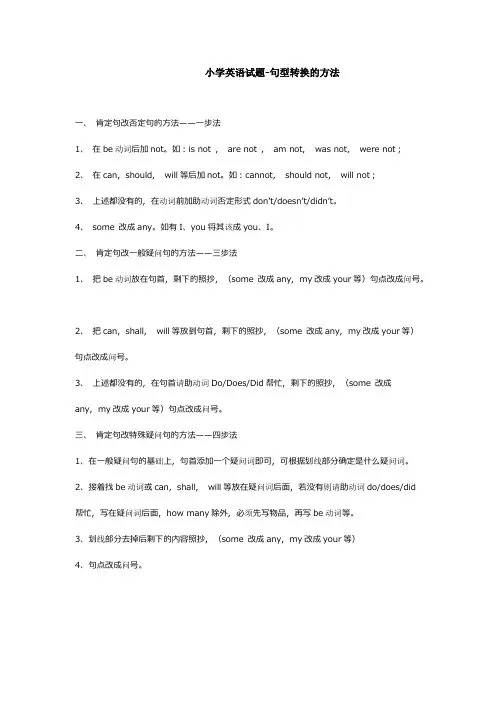
小学英语试题-句型转换的方法一、肯定句改否定句的方法——一步法1、在be动词后加not。
如:is not ,are not ,am not,was not,were not;2、在can,should,will等后加not。
如:cannot,should not,will not;3、上述都没有的,在动词前加助动词否定形式don’t/doesn’t/didn’t。
4、some 改成any。
如有I、you将其该成you、I。
二、肯定句改一般疑问句的方法——三步法1、把be动词放在句首,剩下的照抄,(some 改成any,my改成your等)句点改成问号。
2、把can,shall,will等放到句首,剩下的照抄,(some 改成any,my改成your等)句点改成问号。
3、上述都没有的,在句首请助动词Do/Does/Did帮忙,剩下的照抄,(some 改成any,my改成your等)句点改成问号。
三、肯定句改特殊疑问句的方法——四步法1、在一般疑问句的基础上,句首添加一个疑问词即可,可根据划线部分确定是什么疑问词。
2、接着找be动词或can,shall,will等放在疑问词后面,若没有则请助动词do/does/did 帮忙,写在疑问词后面,how many除外,必须先写物品,再写be动词等。
3、划线部分去掉后剩下的内容照抄,(some 改成any,my改成your等)4、句点改成问号。
如:what (什么)\how(怎样)\ who(谁)\ which(哪一个)\why(为什么)where(哪里)how many(多少)\how much (多少钱)\what colour(什么颜色)\ how old(多大)\……等等……一、把be动词(am is are)和情态动词(can, may, must...)放到句首,其它照写。
遇I/we—you, my—your. some—any. 句号变成问号(?)例如:陈述句: They are in the park. He can play the guitar..一般疑问句: Are they in the park? Can he play the guitar?把下列句子变成一般疑问句1. I am listening to music.____________________________________2. Mike is a student.__________________________________________3. Sarah can clean the classroom.________________________________4. They are in the zoo.________________________________________5. There are some flowers in the vase.__________________________6.This is my sister._________________________________________ ___7.We are sweeping the floor._________________________ _________二、借助助动词do/does,第三人称单数用does,其余人称用do,放到句首,其他照写。
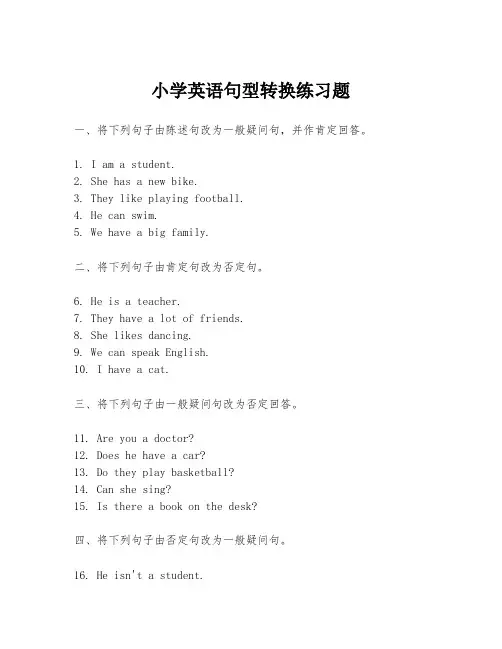
小学英语句型转换练习题一、将下列句子由陈述句改为一般疑问句,并作肯定回答。
1. I am a student.2. She has a new bike.3. They like playing football.4. He can swim.5. We have a big family.二、将下列句子由肯定句改为否定句。
6. He is a teacher.7. They have a lot of friends.8. She likes dancing.9. We can speak English.10. I have a cat.三、将下列句子由一般疑问句改为否定回答。
11. Are you a doctor?12. Does he have a car?13. Do they play basketball?14. Can she sing?15. Is there a book on the desk?四、将下列句子由否定句改为一般疑问句。
16. He isn't a student.17. She doesn't have a new computer.18. They don't like watching TV.19. I can't run fast.20. We don't have any apples.五、将下列句子由一般现在时改为一般过去时。
21. I go to school every day.22. She plays the piano every evening.23. They watch TV every night.24. He reads books every weekend.25. We walk to the park every morning.六、将下列句子由一般过去时改为一般现在时。
26. I went to the zoo last week.27. She played the guitar last night.28. They watched a movie yesterday.29. He read a book last month.30. We walked to the park last year.七、将下列句子由一般将来时改为一般现在时。
小学六年级英语句型转换的练习(5篇)第一篇:小学六年级英语句型转换的练习小学六年级英语句型转换的练习1.对fourteen million people进行提问2.I am a farmer 改为一般疑问句3.It's a small cat 改为一般疑问句4.I can fly a kite 改为否定句5.Is there any milk in the glass 作肯定回答6.They are cleaning the room 对cleaning the room进行提问7.I've got a new story book 改为一般疑问句8.Reading is my hobby 对Reading进行提问9.I have got a basketball改为一般疑问句10.I've got a TV.改为否定句11.He has got a violin.对a violin进行提问.12.I can send you one.改为一般疑问句13.She's got a postcard form China.改为否定句14.Can the monkey jump?作否定回答15.He hasn't got a book about China.改为肯定句16.Jack and Mike are American.改为一般疑问句17.I can do it.改为一般疑问句第二篇:句型转换练习句型转换练习:一、反问句与陈述句有时为了表达的需要,可以把陈述句变为反问句,也可以把反问句变为陈述句,它们的意思相同,语气有所不同。
(1)反问句变陈述句的方法1、先删去反问词(怎能、怎么、难道、哪里等等),有的句子可适当再加上“很”“都”等,使句子表达的意思更准确。
2、看句子里的有没有否定词“不”,有的给删去,没有的给加上。
3、反问语气词删去“?”变“。
”(2)陈述句变反问句的方法第一步与第三步正好相反,第二步一样。
小学英语句型转换练习题小学英语句型转换练习题英语学习是小学生学习的重要一环,句型转换是英语学习中的基础内容之一。
通过句型转换的练习,可以帮助学生巩固所学的语法知识,提高语言运用能力。
下面将给大家介绍一些小学英语句型转换的练习题。
一、句型转换(肯定句、否定句、一般疑问句、特殊疑问句)1. He is a student.(改为否定句)→ He is not a student.2. They can swim.(改为一般疑问句)→ Can they swim?3. The cat is black.(改为特殊疑问句)→ What color is the cat?4. She likes apples.(改为否定句)→ She doesn't like apples.5. We have a book.(改为一般疑问句)→ Do we have a book?二、句型转换(一般现在时、一般过去时、一般将来时)1. I go to school every day.(改为一般过去时)→ I went to school yesterday.2. She will visit her grandparents next week.(改为一般现在时)→ She visits her grandparents every week.3. They played soccer in the park yesterday.(改为一般将来时)→ They will play soccer in the park tomorrow.4. He watches TV in the evening.(改为一般过去时)→ He watc hed TV in the evening.5. We will have a picnic this weekend.(改为一般现在时)→ We have a picnic every weekend.三、句型转换(一般现在时、现在进行时、一般过去时)1. She sings a song every day.(改为现在进行时)→ She is singing a song.2. They played basketball yesterday.(改为一般现在时)→ The y play basketball every day.3. We are studying English now.(改为一般过去时)→ We studied English yesterday.4. He reads books in the library.(改为现在进行时)→ He is reading books in the library.5. I watched a movie last night.(改为一般现在时)→ I watch a movie ever y night.通过以上的练习题,学生可以巩固所学的句型转换知识,提高语言运用能力。
小学英语四年级专项练习(句型变换)一、一定句改否认句的方法——一步法1、在 be 动词后加 not。
如: is not , are not , am not, was not, were not;比如: He is in the classroom. 改(为否认句)He is not ( isn’ t ) in the classroom.2、在 can,should, will 等后加 not。
如: can not, should not, will not ;比如: Mike can sing English songs. (改为否认句)Mike can not ( can’t ) sing English songs.3、上述都没有的,在动词前加助动词否认形式don’ t/doesn’t/didn’t。
比如: I like pizza. ( 改为否认句)I don’t like pizza.4、句中有 some 的要改成 any。
比如: There are some books on the desk. 改(为否认句)There are not ( aren’t ) any books on the desk.练习1.I ’ m in the TV room.2.I like dolls.3.He ’ s cold.4.John is walking in the park.5.Tom and Marry are friends.6.I ’m a student.7.She will go to Beijing tomorrow,8.We get there by bike.9.He likes apples.10.There are some flowers in the picture.11.I often play football with my friend.12.We are from China.13.Sit down.二、一定句改一般疑问句的方法——三步法1、把 be 动词放在句首,剩下的照抄,( some 改成 any,my 改成your 等)句点改成问号。
完整word版)小学英语句型转换专项训练例如:XXX XXX.Can XXX sing English songs?3、把助动词do,does,did放到句首,主语和动词照抄,(some改成any,my改成your等)句点改成问号。
例如:I like pizza.Do you like pizza?练1.You are in the TV room.2.They like dolls.3.He is cold.4.John is XXX.5.Tom and Marry are friends.6.We are students.7.She will go to Beijing tomorrow.8.You get there by bike.9.XXX.10.There are some flowers in the picture.11.You often play football with your friend.12.We are from China.13.XXX sitting down?1.Whose fan is this?2.What do you like?3.Who do you see?4.What kind of girl is she?5.Whose shoes are these?6.What do you need?7.What are you doing?8.What is Mike'XXX?9.Who can clean the classroom?10.Where are they?11.What is in the vase?12.Who is this person?13.What are you doing?14.What do they like doing?15.Where do Su Hai and Su Yang live?16.Why did you put a book on your head?17.XXX?18.When do you play basketball?19.What does Tom like doing?1.特殊疑问词的使用当我们想询问一个事物或物品时,我们可以使用特殊疑问词“what”,例如:“This is a book.” 可以问:“What is this?”同样地,如果我们想询问一个人在某个时间或某个地点做了什么事情,我们可以使用特殊疑问词“what”,例如:“I often play XXX” 可以问:“What do you often do on Saturdays?”2.特殊疑问词“who”当我们想询问一个人的身份时,我们可以使用特殊疑问词“who”,例如:“XXX” 可以问:“Who is he?”3.特殊疑问词“where”当我们想询问一个地点时,我们可以使用特殊疑问词“where”,例如:“The box is on the desk.” 可以问:“Where is the box?”4.特殊疑问词“what time”或“when”当我们想询问一个时间时,我们可以使用特殊疑问词“what time”或“when”,例如:“It'XXX.” 可以问:“What time is it?” 或者:“I usually get up at six.” 可以问:“When do you usually get up?”5.特殊疑问词“how old”当我们想询问一个人的年龄时,我们可以使用特殊疑问词“how old”,例如:“I am twelve.” 可以问:“How old are you?” 或者:“XXX-three.” 可以问:“How old is your father?”6.特殊疑问词“what”当我们想询问一个人的职业时,我们可以使用特殊疑问词“what”,例如:“Mike is a worker.” 可以问:“What is Mike?”7.特殊疑问词“what colour”当我们想询问一个物品的颜色时,我们可以使用特殊疑问词“what colour”,例如:“My hat is blue.” 可以问:“XXX?”8.特殊疑问词“how many”或“how much”当我们想询问一个数量时,我们可以使用特殊疑问词“how many”或“how much”,例如:“I can XXX” 可以问:“How many kites can you see?” 或者:“There is some milk in the glass.” 可以问:“How much milk is there in the glass?”9.特殊疑问词“how much”当我们想询问一个物品的价格时,我们可以使用特殊疑问词“how much”,例如:“This pen is nine yuan.” 可以问:“How much is this pen?”10.特殊疑问词“whose”当我们想询问一个物品的所有者时,我们可以使用特殊疑问词“whose”,例如:“That is my book.” 可以问:“XXX?”XXX。
小学英语句型转换练习题一、陈述句与特殊疑问句转换1. She is playing the piano.→ What is she doing?2. They are eating ice cream.→ What are they doing?3. He likes basketball.→ What does he like?4. We have a test tomorrow.→ When do we have a test?5. Amy has a cute dog.→ What does Amy have?二、一般疑问句与特殊疑问句转换1. You can swim, can't you?→ Can you swim?2. They have finished their homework, haven't they?→ Have they finished their homework?3. She is going to the party, isn't she?→ Is she going to the party?4. He was reading a book, wasn't he?→ Was he reading a book?5. We have seen the movie, haven't we?→ Have we seen the movie?三、肯定句与否定句转换1. She likes apples.→ She doesn't like apples.2. They can skate.→ They can't skate.3. He will go to school tomorrow.→ He won't go to school tomorrow.4. We had lunch at the restaurant.→ We didn't have lunch at the restaurant.5. I am doing my homework.→ I am not doing my homework.四、选择疑问句与特殊疑问句转换1. Is he going to the park or the zoo?→ Where is he going?2. Does she want an apple or an orange?→ What does she want?3. Did they watch a movie or play games?→ What did they do?4. Are you going to the party or staying at home?→ What are you doing?5. Will they have pizza or pasta for dinner?→ What will they have for dinner?五、改写句子类型1. He is running fast. (改为感叹句)→ How fast he is running!2. They are playing soccer. (改为一般疑问句)→ Are they playing soccer?3. She plays the guitar every day. (改为否定句)→ She doesn't play the guitar every day.4. We went to the beach last summer. (改为特殊疑问句)→ When did we go to the beach?5. I will help you with your homework. (改为选择疑问句)→ Will I help you with your homework or not?六、完成对话A: Hello, can I help you?B: Yes, I'm looking for a book about science.A: (1) ________________?B: I need it for my science project.A: (2) ________________?B: Sure, I have a library card.A: Great. (3) ________________?B: Hmm, I'm not sure. Can you recommend a popular one?A: (4) ________________. It's very informative and easy to understand. B: That sounds perfect. Thank you!A: (5) ________________.B: Bye!(1) What are you looking for?(2) Do you have a library card?(3) Do you know any specific book?(4) I recommend "Science Explained".(5) You're welcome.。
按要求改写句子1.That’s a horse in English.(就画线部分提问)What’s_ that _ in English?2.What’s on the desk? (回答问题)___There_____ ___is_____ a pen.3.What’s this in Chinese? (同意句)What’s ___the _____ _Chinese_______ __for______this?4.Is it a horse? (肯定句)___It _____ ___is_____ a ___horse_____.5.This is a horse. (变复数形式)__These ________ ___are_______ __horses________6.We call it a foal. (就画线部分提问)__What_____ __do______ __you_____ _call______ ___it_____?7.What’s this in English? (用these替换划线部分)_What______ __are_____ __these_____ __in______ __English______? 8.That is a sheep. (变否定句)__That________ _isn’t_________ ____a______ _____sheep_____.9.These are kids. (就画线部分提问)__What____ __are_____ _these_____?10.This is a tiger.(一般疑问句)__Is________ __this_____ ___a_____ __tiger_____?11.We can call it a bird.(画线部分提问)__What_____ __can______ _you______ ___call_____ ____it____?12.That is a cub.(一般疑问句)___Is____ __that____ ___a____ ___cub____?13.We can call it a monkey. (一般疑问句)__Can____ ___you____ __call_____ ___it____ ____a__ ___monkey____?14.Is that little bird nice? (肯定句)_That_____ _little_____ __bird______ ___is____ ___nice____.15.Can your brother swim? (肯定句)___My____ __brother____ ___can_____ ___swim____.16.Do you want to be a teacher? (肯定句)__I_____ __want_____ ___to_____ __be______ __a_____ ___teacher____.17.This is a lamb. (否定句)___This_______ __isn’t____ _a_____ __lamb____.18.These are goslings. (对画线部分提问)__What are __ these_____?19.Are these lovely chicks yours? (改肯定陈述句___These lovely chicks are mine____20.The ducks can swim. (改一般疑问句)__Can the ducks swim?_______________21.Those are pigs. (一般疑问句)___Are those pigs?____________________22.Those are shops. (就画线部分提问)____What are those?__________________23.Are the little animals funny? (肯定句)___The little animals are funny.______________24.I read a story in the classroom. (变该句为复数形式)We read stories in the classroom,.25.Those are English books. (变该句为单数形式)That is an English book.26.We often go to the park on Sunday. (改为一般疑问句)Do you often go to the park on Sunday?27.Are those lovely puppies yours? (改为肯定陈述句)Those lovely puppies are mine.28.They are elephants. (变该句为单数形式)It is an elephant.29.We have two maths classes. (改为一般疑问句)Do you have two maths classes?30.That’s a duck in English. (就画线部分提问)What’s that in English?31.These are tiger cubs. (改为一般疑问句)Are these tiger cubs?32.There are some monkeys in the picture. (改为否定陈述句)There aren’t any monkeys in the picture.33.Please read English now. (改为否定陈述句)Please don’t read English now.34.We can go to the park nest week. (就画线部分提问)What can you do next week?35.I would like a cup of tea. (一般疑问句)Would you like a cup of tea?36.They have two maths classes a week. (就画线部分提问)How many maths classes do they have a week?37.I have three friends in my school. (就画线部分提问)How many friends do you have in your school?38.We have five apples in the bags. (就画线部分提问)How many apples do you have in the bags?39.The boys have ten kittens in the room. (就画线部分提问)Where do the boys have ten kittens?40.They often sing in the club. (就画线部分提问)Where do they often sing?41.Is that little bird nice? (改为肯定陈述句)That little bird is nice.42.Can your brother swim? (改为肯定陈述句)My brother can swim.43.Do you want to be a teacher? (改为肯定陈述句)I want to be a teacher.44.This is a lamb. (改为否定陈述句)This isn’t a lamb.45.They want to go shopping. (就画线部分提问)What do they want to do?46.These are coats.(否定句)These aren’t coats.47.I think you are right.(否定句)I don’t think you are right.48.This is a tiger.(变该句为复数形式)These are tigers.49.They have three English classes a week.(变该句为单数形式)He has an English class a week.50.We often read English in the library.(改为一般疑问句)Do you often read English in the library?51.We often sing and dance in the music club.(就画线部分提问)What do you often do in the music club?52.I have one maths lesson on Monday.(就画线部分提问)How many maths lessons do you have on Monday?53.There is a computer on the desk.(改为一般疑问句)___Is________ ___there________ a computer on the desk?54.There is some bread in the bag. (改为一般疑问句)____Is _______ ___there________ ____any_______ bread in the bag? 55.There is a story book in the corner.(改为否定陈述句)____There_______ ___isn’t________ ____a_______ story book in the corner.56.We read English in the morning. in the morning.(就画线部分提问)___What________ ____do_______ ____you_______ ____do_______ in the morning?57.We study plants and animals in the science corner. (就画线部分提问)__What_________ __do_________ ___you________ __study_________ in the science corner?58.There are some balloons in the classroom. (改为一般疑问句)Are there any balloons in the classroom?59.There is some water in the bottle. (改为否定陈述句)Thereisn’t any water in the bottle.60.There are five elephants in the picture. (改为单数)There is an elephant in the picture.61.Are there two foals on the field? (改为肯定句)There are two foals on the field.62.We have six classes every day. (就画线部分提问)How many classes do youhave every day?63.We play hockey on the field. (就画线部分提问)Where do you play hockey? 64.They can watch TV at home. (就画线部分提问)Where can they watch TV? 65.They play the violin after school. (就画线部分提问)What do they do after school? 66.There are three girls in the room. (就画线部分提问)How many girls are there in the room?67.We study birds in the forest. (就画线部分提问)Where do you study bird?68.I like science field trip very much. (就画线部分提问)How do you like science fieldtrip ?69.They do exercises at ten. (就画线部分提问)What do they do at ten? 70.We have six pictures. (就画线部分提问)How many pictures do you have ?71.This storybook is interesting. (改为一般疑问句)Is this storybookinteresting ?72.I can help you.(改为一般疑问句)__Can______ I ____help____ you?73.We can play football in the school.(改为一般疑问句)__Can______ __you______ _play_______ _football_______ in the school?74.I can draw pictures.(就划线部分提问)__What______ ___can___ __ you _ _do______?75.Can the little boy swim in the river?(改为肯定陈述句)___The _____ ___little _____ __boy______ ___can_____ ___swim_____ in the river.76.I can do exercises at home. (改为否定陈述句)I__can’t ______ ____do____ __exercises______ at home.77.I would like a cup of tea . (改为一般疑问句)Would you like a cup of tea?78.I can see some trees . (改为否定陈述句)I can’t see any trees.79.I can play football in the school . (就划线部分提问)What can you play in the school?80.I want to buy a book . (就划线部分提问)What do you want todo ?81.The walkman is sixty yuan.(就划线部分提问)__How______ __much______ _is_______ the walkman?82.I can speak English. (就划线部分提问)_What_______ ____can____ you __do______?83.The girls can play hockey.(改为单数)__The______ _girl_______ __can______ __play______ _hockey_______. 84.They can study wild plants in the forest.(改为单数)___He_____ __can______ __study______ ___a_____ ___wild________plant_____in the forest.85.The bike is blue. (就划线部分提问)___What_____ __colour______ ___is_____ the bike?86.15.I can walk with my walkman. .(改为一般疑问句)___Can_____you __walk______ with __your______ walkman?87.We can play basketball over there.(就划线部分提问)__Where______ ___can__ __ you _ _play_____ basketball?88.These books are eighty_yuan. (就划线部分提问)__How______ __much______ _are_______ these books?89.I can show you my photos. (改为一般疑问句)__Can ______you __show______me _ __ your___ photos?90.I can buy shoes in a shop. (就划线部分提问)__Where______ __can______ you __buy______ __shoes______?91.We can go to the park nest week. (就划线部分提问)___What______can_______you___do_____next week?92.The watch is seventy-two yuan. (就划线部分提问)_How_______ __much______ _is_______ the watch?93.Can your brother write in English? (改为肯定陈述句)__My brother can write in English.________________94.I can buy something with money. (就划线部分提问)__What can you buy with money?__________________95.I can study English at home. (改为一般疑问句)__Can you study English at home?_________96.There are some shorts in the bag. (改为否定陈述句__There aren’t any shorts in the bag.________________________97.I can do maths problems. (改为否定陈述句)I can’t do maths problems.98.We can speak English. (改为一般疑问句)Can you speak English ? 99.Can they play hockey? (改为肯定陈述句)They can play hockey . 100.I can look after your sister. (一般疑问句)Can you look after my sister.101.Please give the apple to Miss Gao. (同义句)Please give Miss Gao theapple .102.The blue coat is mine. (就画线部分提问)Which coat is yours .103.Dick has only one big apple. (就画线部分提问)How many big apples doesDick have ?104.Does the boy with a book study Japanese well? (肯定句)The boy with a book studiesJapanese well.105.I like pink best. (同义句)Pink is my favourite colour . 106.All of them like English. (同义句)Each of them likes English.107.There is an empty box on the chair. (同义句)The box on the chair isempty .108.How much are the oranges? (同义句)What’s the price of the oranges? 109.My foot hurts. (就画线部分提问)What’s wrong with you? 110.The Animal Hospital is over there. (就画线部分提问)Where is the AnimalHospital ?111.Take the books to the room. (改为否定陈述句)Don’t take the books to the room. 112.Can the girl in red go to school? (改为肯定陈述句)The girl in red can go to school.113.Study birds in the forest. (改为否定陈述句)Don’t study birds in the forest.114.Please take him to the school. (改为否定陈述句)Please don’t take him to the school. 115.Please read English now. (改为否定陈述句)Please don’t read English Now. 116.I am ill today. (改为一般疑问句)Are you ill today?117.I have a bad cold. (把主句变为she改写该句)She has a bad cold.118.Move your knee.(改为否定句)Don’t move your knee119.I have a cold.(改为一般疑问句)Do you have a cold?120.I can go to school today. (改为否定句)I can’t go to school today.121.They often do exercises at home.(改为单数形式)He often does exercises at home.组句122.in, we, forest, birds, the, study ( . )We study birds in the forest.123.maths, interesting, our, are, lessons, very( . )Our maths lessons are very interesting.124.farmer’s, I, a, work, study, farm, on, the ( . )I study a farmer’s work on the farm.125.job, very, my, like, much, I ( . )I like my job very much.126.things, like, make, t his(.)Make things like this.127.brother, read, with, English, your, home, at(.) Read English with your brother at home. 128.bike, borrow, friend, a, from, your(.)Borrow a bike from your friend.129.often, on, holiday, Monday, they, to, go, the(.) They often go to the holiday on Monday. 130.they, horse, a, can, ride(?)Can they ride a horse?131.do, do, in, school, what, the, you(?)______What do you do in the school?________ 132.picture, she, can, a, draw(.)___She can draw a picture._________________ 133.experiments, we, class, in, do(.)___We do experiments in class.______________ 134.speak, can, we, English(.)___We can speak English.___________________ 135.this, nice. is, joey (?)_____Is this joey nice?______________________ 136.other, must, we, each, help (.)___We must help each other.________________ 137.is, lamb, where, the (?)___Where is the lamb?____________________ 138.calf, there, nearby, a, is (.)____There is a calf nearby._________________ 139.that, a, cub, lion, is(?)____Is that a lion cub? __________________。
句型转换方法归纳一、改为否定句1、先找be动词或情态动词.如果有这些词,直接在这些词的后面加not, some 改成any,其余照抄;2、如果句子中没有be动词或者是情态动词,要在动词前面加don’t 、doesn’t或者是didn’t,some 改成any,其余部分照抄。
(1)首先判断句子时态,如果句子是过去时,则要在动词前面加didn’t,这个动词用原形;(2)如果句子不是过去时,则判断主语是否为第三人称单数,如是,要在动词前面前加doesn’t,这个动词改为原形,其他情况均要在句子动词前面加don’t。
二、改为一般疑问句(some 改成any,I改成you,my改成your,句号改成问号,其余照抄)1、先找be动词 am, is, are, was, were或情态动词can, should等等 .如果有这些词,直接把这些词放在句子最前面,;2、如果句子中没有be动词或者是情态动词,要在句子最前面加助动词 do 、does或者是did,后面动词用原形。
(1)首先判断句子时态,如果句子是过去时,则要在句子最前面加Did;(2)如果句子不是过去时,则判断主语是否为第三人称单数,如是,要在句子最前面加Does, 其他情况均要在句子最前面加Do三、对划线部分提问第一步:先把句子改成一般疑问句第二步:把提问部分省略,在句子最前面加疑问词。
(如果提问部分是动词词组,要把它改成do;如果提问部分是动名词词组,要把它改成doing)(注:如划线部分为主语,则用who代替,其余照抄)一,对下列句子中划线部分提问1,The deepest part(最深的部分)of the water is near Japan.______________________________________________________________ 2,My father will take me to Beijing.______________________________________________________________great.3,My trip to Xi’an is______________________________________________________________ 4,Harry Potter Ⅳ will be on this afternoon.______________________________________________________________a dress.5,I’m looking for______________________________________________________________ 7,I saw many animals in Beijing Zoo.______________________________________________________________ 8,I often help my grandfather on the farm.______________________________________________________________ 9,I am from Australia.______________________________________________________________ 10,We will go to the nearest supermarket.______________________________________________________________ 11,My new pencil-box is about ten yuan.______________________________________________________________ 12,The name of the book is Sleeping Beauty.______________________________________________________________ 13,He came to visit China two days ago.______________________________________________________________ 14,There are twelve students over there.______________________________________________________________ 16,These sneakers are 280 yuan.______________________________________________________________every morning.17,I get up at 6 o’clock______________________________________________________________20,Tom saw many places of interest(名胜古迹)in that old city.______________________________________________________________ 21,I came here by train.______________________________________________________________ 22,We are going to b uy tomorrow’s air tickets.______________________________________________________________ 23,He’smaking a model ship.______________________________________________________________ 24,My father works in Africa.______________________________________________________________ 25,Mike wants to be a singer(歌手) in the future.______________________________________________________二,把下列句子变为一般疑问句:1. I am good at swimming.______________________________________________________2. Mike is a student in Grade Six.______________________________________________________3. Tom likes listening to the music______________________________________________________4. Sarah can clean the classroom.______________________________________________________6.He came to visit China two days ago(两天前).______________________________________________________7. I can speak English well.______________________________________________________8. Tony had a picnic for a long time.______________________________________________________9. They like making the cakes.______________________________________________________10. Jim and Ben often help their grandfather on the farm after school.______________________________________________________12. He wants to be an actor(演员)in the future(将来).______________________________________________________ 13.We play basketball on Sundays.______________________________________________________ 14.We should take care of(照看)the young trees.______________________________________________________ 15. The girls are singing in the classroom.______________________________________________________ 16. She has something to eat.______________________________________________________ 17. Alice came to our home last week.______________________________________________________ 18. The little boy is standing on the man's shoulders.______________________________________________________ 19.There is some fruit juice in the glass.______________________________________________________ 20. We will visit America next week(下一周).______________________________________________________ 三,将下列句子变为否定句:1.He takes some pictures every day.______________________________________________________ 4.Show me your library card, please.______________________________________________________ 8.There are a lot of lovely animals there.______________________________________________________ 9.My mother will take me to Beijing next Sunday.______________________________________________________ 10.You can find many tall trees in the picture .______________________________________________________。